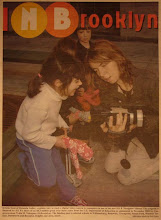 This Monday and Tuesday I went to a conference that the Art and Design Education Department at Pratt hosted: Childhood Regained. Vea Vecchi, first Reggio Emilia atelierista; Kieran Egan, Imaginative Education Research Group founder/director; and many others contributed. The work of Vivian Paley was woven throughout the conference, as presented by Patsy Cooper (NYU) and Jane Katch (who worked with Paley). I was struck by the film, "My Own Backyard to Play In," a document of children playing in the streets of Hell's Kitchen, c. 1950, by Tony Schwartz. Because it combined voices from so many of my influences, with the addition of this film document that I had not known about, the conference was quite a powerful experience.
This Monday and Tuesday I went to a conference that the Art and Design Education Department at Pratt hosted: Childhood Regained. Vea Vecchi, first Reggio Emilia atelierista; Kieran Egan, Imaginative Education Research Group founder/director; and many others contributed. The work of Vivian Paley was woven throughout the conference, as presented by Patsy Cooper (NYU) and Jane Katch (who worked with Paley). I was struck by the film, "My Own Backyard to Play In," a document of children playing in the streets of Hell's Kitchen, c. 1950, by Tony Schwartz. Because it combined voices from so many of my influences, with the addition of this film document that I had not known about, the conference was quite a powerful experience.I was riveted by Vea's invocation to us as early childhood educators to "explore the digital environment." She presented the most beautiful images of a project from a school in Reggio in which the children (4-6 years old) explored the shadow/reflection of a window on a wall in the new Malaguzzi Center, created in honor of Loris Malaguzzi, founder of the Reggio Emilia schools. The children photographed, discussed, traced, and created an animation of their drawings based on this window's moving image on the wall. Children's exploratory thoughts about the shadow: "The wall is crooked." "The sun is attached to the wall." "When the sun is straight, the shadow is straight." "The shadow went back into the window." "It's a sneaky shadow." "This shadow tells lots of stories." "It's pushing hard to open." "Listen--its heart is beating." "When it goes away, it takes the memory with it."
Listening to these young children's profoundly beautiful observations about a moving shadow on the wall, I was again convinced that it is truly great work to encourage children to come into that space within which they can arrive at such conclusions. They are poets, as Richard Lewis of Touchstone Center reminds us. They teach us how to live, how to be poets, how to see.
To go one step further, seeing the inherently visual nature of Vea's presentation about an activity that for the children had been so visual, and yet scientific and literary, reminded me that the teachers at the Reggio schools have consistently showed us the power of adult facilitation of children's visual, and by extension cognitive, understandings. We have the responsibility to help young children take their explorations of the world to the next level, cognitively, by sharing with them more tools to explore, and by showing them how they can use these tools for deeper exploration. Vea showed us in her presentation how important digital media, particularly stop motion with still images like the children's drawings, have become to the Reggio atelier. She challenged the audience to mine the digital mediums available to us, to fully employ the "digital environment," as she put it, and I heard her loud and clear.

No comments:
Post a Comment